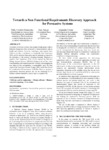Mostrar o rexistro simple do ítem
Towards a Non-Functional Requirements Discovery Approach for Persuasive Systems
| dc.contributor.author | Condori Fernández, Nelly | |
| dc.contributor.author | Araujo, Joao | |
| dc.contributor.author | Catalá, Alejandro | |
| dc.contributor.author | Lago, Patricia | |
| dc.date.accessioned | 2020-04-24T14:04:10Z | |
| dc.date.available | 2020-04-24T14:04:10Z | |
| dc.date.issued | 2020-03-30 | |
| dc.identifier.citation | Condori-Fernandez, N.; Lago, P.; Luaces, M.R.; Places, Á.S. An Action Research for Improving the Sustainability Assessment Framework Instruments. Sustainability 2020, 12, 1682. https://doi.org/10.3390/su12041682 | |
| dc.identifier.isbn | 9781450368667 | |
| dc.identifier.uri | http://hdl.handle.net/2183/25426 | |
| dc.description.abstract | [Abstract] A number of software systems that attempt to help people achieve behavior change have been proposed in various domains such as health and wellness. However, sometimes, such systems have failed to provide a satisfactory or sustainable User Experience (UX), as it is observed when users may be reluctant to respond to the activation of the systems' changing demands. Moreover, a negative User Experience (UX) can be exposed by Behavior Change Support Systems (BCSS) if designers do not have clear understanding of the requirements that factually help changing the user behavior that accomplishes a sustainability goal. We first explored the Persuasive System Design (PSD) model that should be considered in UX assessment of BCSSs. Then, we propose a requirements discovery process that can be considered to redesign a software interactive system based on negative UX. | es_ES |
| dc.description.sponsorship | This work has received partial support by the projects FEDER-UE CSI ED431G/01, ED43C 2018/29, accreditation 2016-2019 ED431G/08, KUSISQA supported by N° 014-2019-FONDECYT-BM-INC.INV, NOVA LINCS UID/CEC/04516/2019, MICINN IJC2018-037522-I, RTI2018-099646-B-I00 | es_ES |
| dc.description.sponsorship | Xunta de Galicia; ED431G/01 | es_ES |
| dc.description.sponsorship | Xunta de Galicia; ED43C 2018/29 | es_ES |
| dc.description.sponsorship | Xunta de Galicia; ED431G/08 | es_ES |
| dc.description.sponsorship | Gobierno de Chile; 014-2019-FONDECYTBM-INC.INV | es_ES |
| dc.description.sponsorship | República Portuguesa. Fundação para a Ciência e a Tecnologia; UID/CEC/04516/2019 | es_ES |
| dc.language.iso | eng | es_ES |
| dc.publisher | Association for Computing Machinery | es_ES |
| dc.relation | info:eu-repo/grantAgreement/AEI/Plan Estatal de Investigación Científica y Técnica y de Innovación 2017-2020/IJC2018-037522-I/ES/ | |
| dc.relation | info:eu-repo/grantAgreement/AEI/Plan Estatal de Investigación Científica y Técnica y de Innovación 2017-2020/RTI2018-099646-B-I00/ES/MODELOS, TECNICAS Y METODOLOGIAS BASADAS EN LA INTELIGENCIA ARTIFICIAL PARA LA MEJORA DE LA ADHERENCIA TERAPEUTICA | |
| dc.relation.uri | https://doi.org/10.1145/3341105.3374059 | es_ES |
| dc.subject | Non-functional requirements | es_ES |
| dc.subject | Persuasive systems | es_ES |
| dc.subject | UX assessment | es_ES |
| dc.subject | Sustainability | |
| dc.title | Towards a Non-Functional Requirements Discovery Approach for Persuasive Systems | es_ES |
| dc.type | info:eu-repo/semantics/conferenceObject | es_ES |
| dc.rights.access | info:eu-repo/semantics/openAccess | es_ES |
| UDC.journalTitle | Proceedings of the ACM Symposium on Applied Computing | es_ES |
| UDC.startPage | 1418 | es_ES |
| UDC.endPage | 1420 | es_ES |
| dc.identifier.doi | 10.1145/3341105.3374059 | |
| UDC.conferenceTitle | 35th Annual ACM Symposium on Applied Computing, SAC 2020; Brno; Czech Republic; 30 March 2020 through 3 April 2020 | es_ES |






